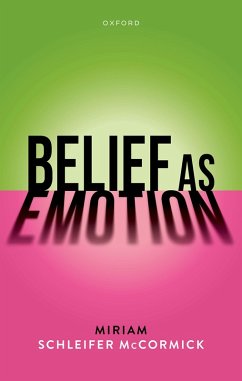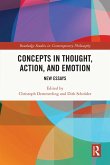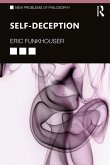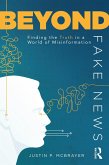Miriam Schleifer McCormick
Belief as Emotion (eBook, ePUB)
51,95 €
51,95 €
inkl. MwSt.
Sofort per Download lieferbar

26 °P sammeln
51,95 €
Als Download kaufen

51,95 €
inkl. MwSt.
Sofort per Download lieferbar

26 °P sammeln
Jetzt verschenken
Alle Infos zum eBook verschenken
51,95 €
inkl. MwSt.
Sofort per Download lieferbar
Alle Infos zum eBook verschenken

26 °P sammeln
Miriam Schleifer McCormick
Belief as Emotion (eBook, ePUB)
- Format: ePub
- Merkliste
- Auf die Merkliste
- Bewerten Bewerten
- Teilen
- Produkt teilen
- Produkterinnerung
- Produkterinnerung

Bitte loggen Sie sich zunächst in Ihr Kundenkonto ein oder registrieren Sie sich bei
bücher.de, um das eBook-Abo tolino select nutzen zu können.
Hier können Sie sich einloggen
Hier können Sie sich einloggen
Sie sind bereits eingeloggt. Klicken Sie auf 2. tolino select Abo, um fortzufahren.

Bitte loggen Sie sich zunächst in Ihr Kundenkonto ein oder registrieren Sie sich bei bücher.de, um das eBook-Abo tolino select nutzen zu können.
Belief as Emotion argues that belief is a type of emotion, where emotions are understood as irreducibly blended states that transcend the cognitive/non-cognitive divide, containing representational, motivational and phenomenological elements.
- Geräte: eReader
- mit Kopierschutz
- eBook Hilfe
- Größe: 0.53MB
Andere Kunden interessierten sich auch für
![Concepts in Thought, Action, and Emotion (eBook, ePUB) Concepts in Thought, Action, and Emotion (eBook, ePUB)]() Concepts in Thought, Action, and Emotion (eBook, ePUB)41,95 €
Concepts in Thought, Action, and Emotion (eBook, ePUB)41,95 €![Delusions and Beliefs (eBook, ePUB) Delusions and Beliefs (eBook, ePUB)]() Kengo MiyazonoDelusions and Beliefs (eBook, ePUB)23,95 €
Kengo MiyazonoDelusions and Beliefs (eBook, ePUB)23,95 €![The Routledge International Handbook of Morality, Cognition, and Emotion in China (eBook, ePUB) The Routledge International Handbook of Morality, Cognition, and Emotion in China (eBook, ePUB)]() The Routledge International Handbook of Morality, Cognition, and Emotion in China (eBook, ePUB)45,95 €
The Routledge International Handbook of Morality, Cognition, and Emotion in China (eBook, ePUB)45,95 €![Virtue Ethics for the Real World (eBook, ePUB) Virtue Ethics for the Real World (eBook, ePUB)]() Howard J. CurzerVirtue Ethics for the Real World (eBook, ePUB)41,95 €
Howard J. CurzerVirtue Ethics for the Real World (eBook, ePUB)41,95 €![Self-Deception (eBook, ePUB) Self-Deception (eBook, ePUB)]() Eric FunkhouserSelf-Deception (eBook, ePUB)39,95 €
Eric FunkhouserSelf-Deception (eBook, ePUB)39,95 €![Experimental Philosophy (eBook, ePUB) Experimental Philosophy (eBook, ePUB)]() Experimental Philosophy (eBook, ePUB)18,95 €
Experimental Philosophy (eBook, ePUB)18,95 €![Beyond Fake News (eBook, ePUB) Beyond Fake News (eBook, ePUB)]() Justin P. McbrayerBeyond Fake News (eBook, ePUB)31,95 €
Justin P. McbrayerBeyond Fake News (eBook, ePUB)31,95 €-
-
-
Belief as Emotion argues that belief is a type of emotion, where emotions are understood as irreducibly blended states that transcend the cognitive/non-cognitive divide, containing representational, motivational and phenomenological elements.
Dieser Download kann aus rechtlichen Gründen nur mit Rechnungsadresse in A, B, BG, CY, CZ, D, DK, EW, E, FIN, F, GR, HR, H, IRL, I, LT, L, LR, M, NL, PL, P, R, S, SLO, SK ausgeliefert werden.
Produktdetails
- Produktdetails
- Verlag: Oxford University Press
- Seitenzahl: 192
- Erscheinungstermin: 31. Oktober 2024
- Englisch
- ISBN-13: 9780198875840
- Artikelnr.: 72246028
- Verlag: Oxford University Press
- Seitenzahl: 192
- Erscheinungstermin: 31. Oktober 2024
- Englisch
- ISBN-13: 9780198875840
- Artikelnr.: 72246028
- Herstellerkennzeichnung Die Herstellerinformationen sind derzeit nicht verfügbar.
Miriam Schleifer McCormick is a Professor of Philosophy at the University of Richmond. Her central research interests focus on the nature and norms of belief. This interest has also led her to think and write about reasons, agency, hope, imagination, and emotions. She has published articles on issues at the cross section of epistemology and ethics, and is the author of Believing Against the Evidence: Agency and the Ethics of Belief (Routledge, 2015) She is a researcher in the normativity and affectivity axis of GRIN and collaborating member of the ethical foundation axis at CRÉ, research centres based at the Université de Montréal.
* Preface
* 1: Introduction
* 1.1 Is the view of belief as emotion problematically revisionary?
* 1.2 The standard view of belief and the rise of non-doxasticism
* 1.3 Is this a "merely verbal" dispute"?
* 1.4 Chapter summaries
* 2: Belief as a Blended State
* 2.1 The belief emotion
* 2.2 Questions and clarifications
* 2.3 Different ways of characterizing the belief emotion
* 2.4 Summary
* 3: Defending Doxasticism about Delusions
* 3.1 Motivations for non-doxasticism about delusions
* 3.2 Countering non-doxasticism
* 3.3 Delusions as recalcitrant emotions
* 3.4 Summary
* 4: Defending Doxasticism about Religious Conviction and Political
Ideology
* 4.1 Non- doxasticism in the religious and political domains
* 4.2 Critique of religious and political non-doxasticism
* 4.3 Addressing the normative question
* 4.4 Summary
* 5: Trusting is Believing
* 5.1 Arguments that Trusting is not believing
* 5.2 Arguments that there are no good non-evidential reasons for trust
* 5.3 There can be good non-evidential reasons for emotions, including
belief
* 5.4 Other approaches
* 5.5 Summary
* 6: Implicit attitudes and Self-Deception: Examples of Emotional
Conflict
* 6.1 Self-Deception
* 6.2 Implicit attitudes
* 6.3 The "messiness" of belief
* 6.4 Summary
* 7: Deep Disagreement and Belief Alteration
* 7.1 Why engage with fringe beliefs?
* 7.2 Limits on when to engage
* 7.3 Closed-minded engagement
* 7.4 Belief alteration as emotion alteration
* 7.5 Summary
* Conclusion
* Bibliography
* 1: Introduction
* 1.1 Is the view of belief as emotion problematically revisionary?
* 1.2 The standard view of belief and the rise of non-doxasticism
* 1.3 Is this a "merely verbal" dispute"?
* 1.4 Chapter summaries
* 2: Belief as a Blended State
* 2.1 The belief emotion
* 2.2 Questions and clarifications
* 2.3 Different ways of characterizing the belief emotion
* 2.4 Summary
* 3: Defending Doxasticism about Delusions
* 3.1 Motivations for non-doxasticism about delusions
* 3.2 Countering non-doxasticism
* 3.3 Delusions as recalcitrant emotions
* 3.4 Summary
* 4: Defending Doxasticism about Religious Conviction and Political
Ideology
* 4.1 Non- doxasticism in the religious and political domains
* 4.2 Critique of religious and political non-doxasticism
* 4.3 Addressing the normative question
* 4.4 Summary
* 5: Trusting is Believing
* 5.1 Arguments that Trusting is not believing
* 5.2 Arguments that there are no good non-evidential reasons for trust
* 5.3 There can be good non-evidential reasons for emotions, including
belief
* 5.4 Other approaches
* 5.5 Summary
* 6: Implicit attitudes and Self-Deception: Examples of Emotional
Conflict
* 6.1 Self-Deception
* 6.2 Implicit attitudes
* 6.3 The "messiness" of belief
* 6.4 Summary
* 7: Deep Disagreement and Belief Alteration
* 7.1 Why engage with fringe beliefs?
* 7.2 Limits on when to engage
* 7.3 Closed-minded engagement
* 7.4 Belief alteration as emotion alteration
* 7.5 Summary
* Conclusion
* Bibliography
* Preface
* 1: Introduction
* 1.1 Is the view of belief as emotion problematically revisionary?
* 1.2 The standard view of belief and the rise of non-doxasticism
* 1.3 Is this a "merely verbal" dispute"?
* 1.4 Chapter summaries
* 2: Belief as a Blended State
* 2.1 The belief emotion
* 2.2 Questions and clarifications
* 2.3 Different ways of characterizing the belief emotion
* 2.4 Summary
* 3: Defending Doxasticism about Delusions
* 3.1 Motivations for non-doxasticism about delusions
* 3.2 Countering non-doxasticism
* 3.3 Delusions as recalcitrant emotions
* 3.4 Summary
* 4: Defending Doxasticism about Religious Conviction and Political
Ideology
* 4.1 Non- doxasticism in the religious and political domains
* 4.2 Critique of religious and political non-doxasticism
* 4.3 Addressing the normative question
* 4.4 Summary
* 5: Trusting is Believing
* 5.1 Arguments that Trusting is not believing
* 5.2 Arguments that there are no good non-evidential reasons for trust
* 5.3 There can be good non-evidential reasons for emotions, including
belief
* 5.4 Other approaches
* 5.5 Summary
* 6: Implicit attitudes and Self-Deception: Examples of Emotional
Conflict
* 6.1 Self-Deception
* 6.2 Implicit attitudes
* 6.3 The "messiness" of belief
* 6.4 Summary
* 7: Deep Disagreement and Belief Alteration
* 7.1 Why engage with fringe beliefs?
* 7.2 Limits on when to engage
* 7.3 Closed-minded engagement
* 7.4 Belief alteration as emotion alteration
* 7.5 Summary
* Conclusion
* Bibliography
* 1: Introduction
* 1.1 Is the view of belief as emotion problematically revisionary?
* 1.2 The standard view of belief and the rise of non-doxasticism
* 1.3 Is this a "merely verbal" dispute"?
* 1.4 Chapter summaries
* 2: Belief as a Blended State
* 2.1 The belief emotion
* 2.2 Questions and clarifications
* 2.3 Different ways of characterizing the belief emotion
* 2.4 Summary
* 3: Defending Doxasticism about Delusions
* 3.1 Motivations for non-doxasticism about delusions
* 3.2 Countering non-doxasticism
* 3.3 Delusions as recalcitrant emotions
* 3.4 Summary
* 4: Defending Doxasticism about Religious Conviction and Political
Ideology
* 4.1 Non- doxasticism in the religious and political domains
* 4.2 Critique of religious and political non-doxasticism
* 4.3 Addressing the normative question
* 4.4 Summary
* 5: Trusting is Believing
* 5.1 Arguments that Trusting is not believing
* 5.2 Arguments that there are no good non-evidential reasons for trust
* 5.3 There can be good non-evidential reasons for emotions, including
belief
* 5.4 Other approaches
* 5.5 Summary
* 6: Implicit attitudes and Self-Deception: Examples of Emotional
Conflict
* 6.1 Self-Deception
* 6.2 Implicit attitudes
* 6.3 The "messiness" of belief
* 6.4 Summary
* 7: Deep Disagreement and Belief Alteration
* 7.1 Why engage with fringe beliefs?
* 7.2 Limits on when to engage
* 7.3 Closed-minded engagement
* 7.4 Belief alteration as emotion alteration
* 7.5 Summary
* Conclusion
* Bibliography







